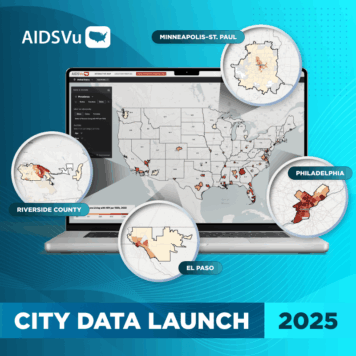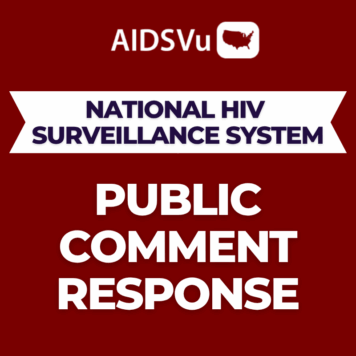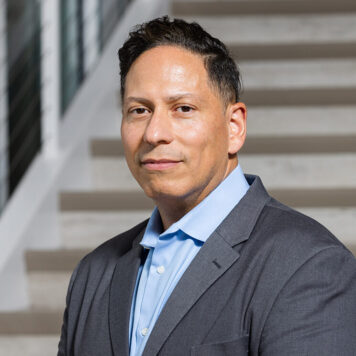Mike Webb is the Public Health Policy Strategist at Equality Federation, a collection of state partner organizations throughout the United States that work collaboratively on critical issues impacting the LGBTQ+ community. In this role, Mike works with state partner organizations to leverage their advocacy capacity to influence state and federal policy while ensuring effective implementation of those policies. Mike has spent the last 10 years rooted in LGBTQ+ political and community organizing.
You have been a LGBTQ+ political activist and community organizer for the past decade. What originally drew you to this line of work?
This is always a tough question for me because the work is both personal and professional. I grew up in the South where I didn’t feel like I could live as my true and free self as a queer person. I spent most of my life fighting for the ability to be truly me. When I found out I was living with HIV roughly 13 years ago, that motivated me further to help create the changes to our systems needed to prevent other Black queer people from experiencing something that should have been defeated decades ago. We cannot accomplish this without political and social activation. And so that’s what motivated me to combine political organizing with LGBTQ+ and HIV activism.
In 2021, over half of all people living with HIV (57%) were Gay and Bisexual Men. There has been a shift in focus in the last decade towards trying to be more inclusive with HIV advocacy so that all impacted groups have a voice. How do we ensure that everyone’s voice is heard, and that health equity remains a primary goal?
To make sure we are including all impacted groups, we must continue to broaden our definitions and understandings of gender while recognizing how people living with HIV are impacted not just by health-focused policies, but by all policies impacting our quality of life. We can do this by building and investing in more advocacy coalitions that center the most impacted communities in that region, mobilizing them to directly impact these policies. We must also be radically inclusive of LGBTQ+ people, especially Black, indigenous, other people of color, transgender people, and those living at the intersections of these identities—especially those of us living with HIV.
This advocacy work also needs more funding. Real change cannot happen if it is completely dependent on free labor. One of the things that I always like to remind everyone is that HIV advocacy is more than just testing and treatment, because often the policies and bills that lawmakers are passing impact our ability to do exactly that—provide testing and treatment. For example, an AIDS services organization or an HIV clinic might have to both address HIV while simultaneously fighting for or against policies that impact their institutions.
In 2022, 68% of people living with HIV—the majority of them Gay and Bisexual Men—in the U.S. resided in the 32 states with specific laws or enhanced sentencing against people living with HIV (PLWH). What progress has been made in challenging these laws across the country, and how does the Equality Federation work to change these policies?
Since 2014, at least 16 states have modernized or completely repealed HIV criminalization laws—most recently in states like Kentucky and Tennessee—proving that modernizing HIV laws is a nonpartisan, non-political issue. Currently, Equality Federation is working in partnership with the Center for HIV Law and Policy, the Elizabeth Taylor AIDS Foundation, and the SERO Project on coalition work, as well as in Maryland in partnership with FreeState Justice on their HIV criminalization repeal efforts. We are also working with partners to do similar HIV modernization efforts in Wisconsin with Fair Wisconsin, Oklahoma with Freedom Oklahoma, and Texas with the Transgender Education Network of Texas. We also provide regular HIV modernization training to all our state partners and to the community at large.
In partnership with other HIV advocates and people with lived experience, we have had successes in providing support to state partners updating their HIV laws—in Nevada with Silver State Equality, in New Jersey with Garden State Equality, in Virginia with Equality Virginia and Echo VA, in Illinois with Equality Illinois and the AIDS Foundation of Chicago, and in Georgia with Georgia Equality.
As you can see, we have worked with a combination of states from across the country, showing that there is momentum building to decriminalize and modernize these HIV laws everywhere. However, it is mostly dependent on a lot of free labor. There are committed advocates like in Texas or in Maryland where people committed to ending HIV, many of lived experience, are spending hours after work mobilizing. Imagine the progress that we can make if there were more investments, not just on this issue but in the states where we are trying to modernize these antiquated HIV laws as well.
While there are many anti-LGBTQ+ bills being introduced in state legislatures, there have been pro-LGBTQ+ bills introduced as well. What are the bills that are being introduced in state legislatures that would have a positive impact on the fight against HIV?
To properly appreciate the positive HIV-related bills that have been filed this year, we must also understand the severity of what our communities are fighting against. We saw over 600 anti-LGBTQ+ bills introduced this past session alone in state legislatures. The reason why I bring that up is because there were actually over 226 bills related to HIV filed as of this May. 90% of these HIV-related bills were positive. 62 of these bills were related to PrEP and PEP access, and 107 of these bills were related to HIV testing and treatment services.
One of the bills we are especially excited about is one in Texas updating its HIV laws. Texas was actually one of the first states in 1994 to fully repeal their HIV criminalization law. However, like in other states, HIV criminalization still happens in the form of penalty enhancements, primarily using people living with HIV’s bodily fluids as a weapon.That means that if a person living with HIV was getting arrested and spit on a police officer, for example, it would be considered assault with a deadly weapon in Texas. To modernize this approach, Texas State Representative Venton Jones introduced HB 2986, which removes bodily fluids as a form of assault with a deadly weapon. Hopefully this approach can be used as a model for other states with similar criminalization issues.
In Arkansas, we also saw the passage of a PrEP access bill that gave pharmacists the ability to prescribe PrEP. In Maryland, a full HIV criminalization repeal bill was introduced that passed the House chamber and was two votes short of passing a Senate committee to make it eligible for a Senate vote. Now, with the governor’s support, we are hoping for a more viable attempt in 2024.
To summarize, addressing HIV should be nonpartisan and one of the few bipartisan advocacy items we all can advocate for. 90% of HIV-related bills in the 2023 session would have had a positive impact on the fight against HIV, ranging from prescription drug access, to cost sharing protections, to PrEP and PEP. 10 states are inching towards universal healthcare within their borders. Around half of the country is moving to quickly codify federal ACA protections for preventive services into their state law in the wake of Braidwood v. Becerra. I’m just so fortunate enough to be part of the Equality Federation team that can support this needed and underinvested state-level work.
September 27 is National Gay Men’s HIV/AIDS Awareness Day, which brings awareness to the impact of HIV/AIDS on the LGBTQ+ community, specifically on gay men. What message do you have for the community on this day?
I took a lot of time to think about this because I want to make it relevant to all gay men while also recognizing the full spectrum of the LGBTQ+ community. In summary, I think it is really important to continue honoring the LGBTQ+ community’s history with our fight against HIV, but also learning how HIV advocacy has often left out Black gay men. talk about this in more detail in our upcoming article in the Body, co-written with our partner at Southern AIDS Coalition Will Ramirez, where we conclude that by working together and investing in approaches that center the needs and experiences of Black LGBTQ+ people, we can transform the systems that have failed us into something that actively serves us. Together we can create a world where Black, queer, and trans communities survive, live, and thrive no matter what new disease progression turns up at our doorsteps.




